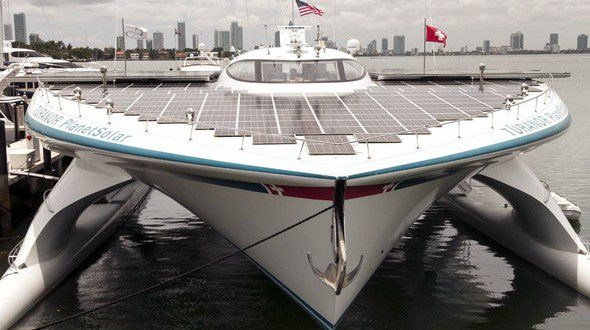 Having left St. Martin on May 23, the catamaran reached her first 2013 American stopover on June 1 after 9 days of solar navigation in weather conditions below seasonal averages. This stage marks the beginning of PlanetSolar’s American tour and most importantly, the launch of the “PlanetSolar DeepWater” scientific expedition. This mission will allow researchers from the University of Geneva to take advantage of the exclusive features of the largest solar boat in the world to conduct a unique campaign of physical and biological measurements along the Gulf Stream. The boat and her crew are docked in Miami from 1 to June 6, 2013—a crucial stopover because a final phase of instrument testing will be conducted there before setting off in conquest of one of the most important regulators of European and North American climates.
Having left St. Martin on May 23, the catamaran reached her first 2013 American stopover on June 1 after 9 days of solar navigation in weather conditions below seasonal averages. This stage marks the beginning of PlanetSolar’s American tour and most importantly, the launch of the “PlanetSolar DeepWater” scientific expedition. This mission will allow researchers from the University of Geneva to take advantage of the exclusive features of the largest solar boat in the world to conduct a unique campaign of physical and biological measurements along the Gulf Stream. The boat and her crew are docked in Miami from 1 to June 6, 2013—a crucial stopover because a final phase of instrument testing will be conducted there before setting off in conquest of one of the most important regulators of European and North American climates.
The MS Tûranor PlanetSolar departed from St. Martin on May 23, and reached the shores of the United States on June 1. The ship will begin the practical stage of her second life—dedicated to science—as part of the expedition that will study the Gulf Stream, one of the most important regulators of European and North American climates. In fact, the solar boat will transform into a genuine scientific platform in Florida and will serve a team of researchers from the University of Geneva (UNIGE), led by Professor Martin Beniston, climatologist and director of the Institute of Environmental Sciences at the University of Geneva (UNIGE).

Professor Martin Beniston.
Through the month of August, the interdisciplinary team of scientists will travel over 8,000 kilometers along the Gulf Stream, between Miami (United States) and Bergen (Norway), via New York, Boston, St. John’s (Canada), and Reykjavik (Iceland). This unique campaign will lead researchers to “navigate along the Gulf Stream and collect scientific data, from both water and air, in order to better understand complex interactions between the ocean and the atmosphere as well as the role of these interactions in climate change” says Professor Beniston. In parallel, a pedagogical team has developed educational activities and resources designed to make young people aware of climate change and its impact.
The MS Tûranor PlanetSolar will significantly contribute to an unprecedented data collection of this ocean current, since the absence of pollution emissions will guarantee that the atmospheric measurements won’t be distorted by residues associated with fuel combustion. The boat also has numerous advantages, such as a world-renowned navigational experience and the fact that she can load her crew plus up to 4 scientists on board. Enthusiastic about starting this measurement campaign, Gérard d’Aboville, captain of the boat, said, “Up to this point, we were in transit in a sense. In a few days we will begin this scientific expedition—the raison d’être of our trip — and life onboard will be organized entirely around the measurements that the University of Geneva researchers will carry out. The entire crew is highly motivated and is getting involved in the final assemblage of the measurement instruments.” In addition, the MS Tûranor PlanetSolar will sail to the northernmost part of the Atlantic for the first time.

“Navigation conditions will change; we are taking leave of the trade winds that have been accompanying us since the Canary Islands to travel along the roving Gulf Stream, first along the American coast, then across the Atlantic,” explains the captain.
Moreover, this Miami stopover is also the first opportunity to demonstrate to Americans the practical applications of a ship propelled uniquely by photovoltaic energy.
Miami, final phase of scientific instrument testing before the PlanetSolar DeepWater expedition
In order to collect a continuous series of physical and biological measurements in the water and in the air, the ship will be equippedwith 6 advanced instruments, including the “Biobox”, an instrument that was specifically developed by the Applied Physics Group at the University of Geneva. It is dedicated to studying aerosols at the interface between the atmosphere and the ocean, and is the only instrument to date capable of instantaneously determining the identity of aerosols using laser technology. It will be used aboard the MS Tûranor PlanetSolar for the first time.
With the framework of the major and final phase of testing on the high seas, the last instrument calibrations will take place in Miami.
ABOUT PLANETSOLAR
The MS Tûranor PlanetSolar, built in Kiel, Germany, is a catamaran powered exclusively by solar energy. On May 4, 2012, after sailing for 584 days and travelling over 60,000 km, the MS Tûranor PlanetSolar completed the first solar-powered trip around the world.
For her 2013 expeditions, the MS Tûranor PlanetSolar underwent major maintenance operations. Among the extensive maintenance tasks and optimizations carried out, noteworthy are the cabin refurbishment, the creation of a walkway on the solar bridge, an increase to water tank capacity, and an improvement to the rudder. The most significant optimizations were related to the propulsion system—the surface propellers were replaced by a completely immerged system.
For 2013, the MS Tûranor PlanetSolar’s crew is comprised of: Gérard d’Aboville (Captain), Stéphane Marseille (Second), Antoine Simon (electrical engineer), and Hugo Buratti (seaman and steward). During the “PlanetSolar DeepWater” expedition, the UNIGE scientific team will round out the crew.
After leaving Las Palmas (Spain) on April 26, 2013, the largest solar boat in the world reached Marigot, St. Martin (French West Indies) 22 days later. A new feat for the MS Tûranor PlanetSolar, who broke her own world record speed for a solar-powered transatlantic crossing, set in 26 days during her trip around the world.
In order to fund the 2013 campaign, PlanetSolar SA is supported by the University of Geneva, Ciel électricité, Switcher, the Swiss AOC-IGP Association, Younicos, Plantbacter, Actides, GoPro, Jean-René Germanier SA, BCCC Attorneys-at-Law, Tempur, Hempel, Présence Suisse, Energissima, l’UIM, YELLO, and Waste Free Oceans.
ABOUT THE UNIVERSITY OF GENEVA
Founded in 1559 by Jean Calvin and Théodore de Bèze, the University of Geneva (UNIGE) is now the second largest “Haute École” in Switzerland, and ranks among the top 100 universities in the world. Crown jewel of the Calvin community, the institution enjoys a privileged international reputation and cultivates its openness to the world. UNIGE welcomes approximately 16,000 students each year to its eight colleges, dealing with the essential domains of science, medicine, literature, economic and social sciences, law, theology, psychology, education, translation, and interpretation sciences. UNIGE has three missions: education, research, and service to the community. Additionally, UNIGE has been a member of the League of European Research Universities (LERU) since 2002.
The University of Geneva would like to thank the Wright Foundation, the Henri Moser Foundation, and a generous anonymous donor for their support for the PlanetSolar DeepWater scientific campaign.






